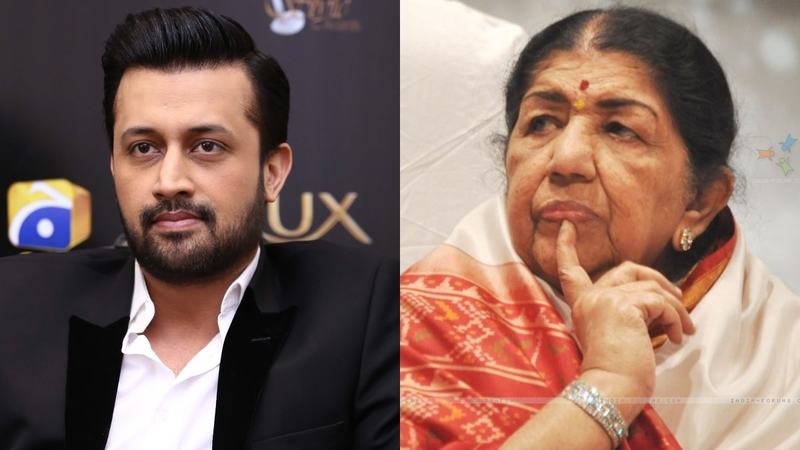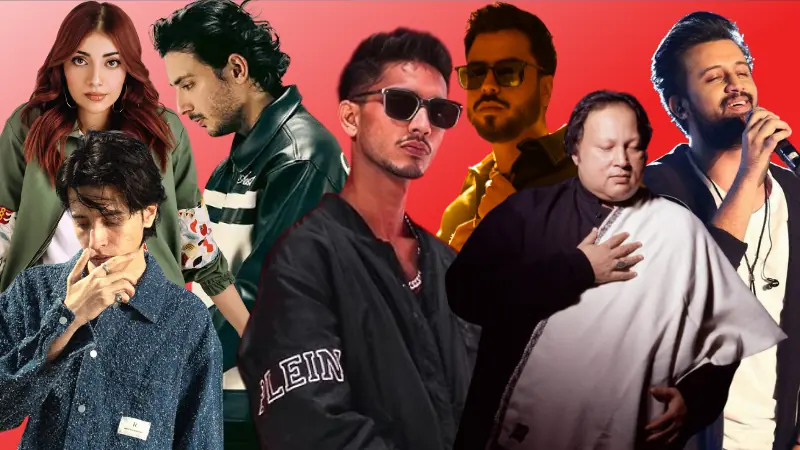I get chills when people say I’m a mini Abida Parveen: Natasha Baig
“Oh my God! You’re a different animal on stage!” exclaimed Ali Hamza, according to Natasha Baig, when he saw a clip of one of her concerts, moments before he and co-producer Zohaib Kazi told her she had been selected for the current season of Coke Studio.
Standing at only 5’1” the singer is a petite person with a big voice. She seems somewhat meek and demure in person, but when she stands in front of a microphone she is completely transformed — every look, gesture, expression perfectly synchronised with her powerhouse vocals, she owns her performance and the audience. And she appears tall, very tall.
After years of struggling, Natasha Baig finally got her big break. She opened the season of the popular music show with a collaboration with Farid Ayaz and Abu Muhammad Qawwal on an improvised version of Allama Iqbal’s Shikwa — she was doing the Shikwa part and she held her own against what is arguably Pakistan’s preeminent qawwal group.
But Coke Studio isn’t the only time she’s appeared on a music show. This talented singer, who’s finally gotten everyone’s attention now, made her television debut several years ago in 2013 through Cornetto Music Icons. Around 20-years-old then, the heavily-fringed, skinny jeans-clad Natasha Baig that was a contestant on the show looked and sounded completely different compared to the artist she is now.
She oozed with confidence even then, and personally I love her performance of one of her original tracks, Yeh Dil Manay Na — it’s a very hip, catchy love song. But then she sounded like a regular pop artist. Nothing like the artist who unleashes her power on stage now and has even the likes of Ali Noor dancing to her performance.
“Back then, I came from a very Western-inspired mindset,” she says. “But Hassan Ali Effendi, my manager, told me I needed to study my voice and see meri awaz kahan pe baith rahi hai [where my voice became weak]. Slowly, I started realising my potential.” He also introduced her to different, more Eastern music.
“Ever since I started doing this type of music, mujh se ab English nahin gaya jata [I can’t sing in English]” she laughs. “I am enjoying singing Sufi and folk music. I am true to myself in this — my voice comes out just the way it is, I don’t have to ‘make’ it.”
It was also at Cornetto Music Icons where she met producer, composer and leader of the orchestra-inspired fusion music band Sounds of Kolachi (SoK), Ahsan Bari. At that time, SoK was in the making, and Natasha was invited to be a part of it. She joined the band in 2014 and left sometime in 2016.
I first heard the band perform live at the Frere Hall as the closing act for the I Am Karachi music festival in 2016. Hoping to avoid the mad rush at the end, I left just as the band started performing, but managed to catch Natasha’s little solo piece before stepping outside. Even with the little that she had (“There was one line that would catch people’s attention in [the song] Allah Hi Deyga, the alaap,” she says) she dominated the stage. As a whole, SoK puts up an impressive concert every single time. I stayed back and listened to the rest of the performance from the parking lot.
Now, for some odd reason, everybody wants me to wish them happy birthday. This is not why I worked so hard: to wish people on their birthdays!” she laughs.
“I feel privileged that I was in SoK,” she says. “I learned a lot. But I wasn’t able to focus on my solo career. Bari didn’t have a problem with my doing that, I just wasn’t able to focus on it. The confidence that you see in me today is because of SoK. After that I went solo. With time and experience I am trying to improve and polish my voice. I’m still learning.”
The perks of being exotic

Although she was born in Karachi, Natasha’s family is originally from Hunza. She has very distinctive features, beautiful prominent high cheekbones and striking, somewhat slanted eyes. When she’s in her ‘fierce’ mode, she reminds one of Mulan — the Disney heroine from China who secretly trained to become a warrior. Does she get asked a lot about where she’s from? “Because my face looks very different, people stare a lot, even women,” she says. “You do feel like an alien. If I’m going somewhere in a rickshaw or a Careem I get asked ‘Ma’am aap Chinese hain? [Are you Chinese]’ When I speak in Urdu so they go like ‘Oh my God!’ in a very exaggerated way.” She rolls her eyes.
“Apnay hi mulk mein mujhey baar baar batana parrta hai [I have to repeatedly tell everyone in my own country] that I’m from Pakistan,” she continues. “But many people ask ‘Where are you from? Because your face is telling us a different story’. Then I have to repeat my [origins] story.”
One gets the impression she likes being ‘exotic’. “Kind of, yeah,” she laughs. “I will be honest, maza aata hai [It’s a lot of fun].”
Life after Shikwa
Now that she’s finally a household name, has anything changed for her? “Yeah, it has,” she responds. “I still get messages [about my performance]. And now, for some odd reason, everybody wants me to wish them happy birthday. This is not why I worked so hard: to wish people on their birthdays!” she laughs.
“I do have some things in the pipeline,” she adds a little seriously. “I feel my journey has just started now.”
I was wondering about that, I tell her, because I feel like you were just waiting for the right opportunity that would help you break through to the mainstream.
“I feel the weight of peoples’ expectations,” she confesses. “I do feel that since Shikwa, the persona that people have of me in their heads… I mean, I get chills when people say, ‘She’s a mini Abida Parveen.’ That’s a lot of pressure because no one can be like Abida Parveen.”
There are some compliments she’s not so intimidated by but which excite her just the same. “At the launch day, Adnan Siddiqui came up to me and said ‘Natasha, you did a great job’. I was like ‘OMG he’s taking my name! He knows me’!” she laughs. “I was talking to Ali Azmat at that time. In front of him Adnan Siddiqui goes, ‘Yeh larrkyon ki Ali Azmat hai! [She is the Ali Azmat of girls]’ And I loved that! I always used to look at Junoon and think, there hasn’t been a female version of this,” she adds. “I was like, yeah, this is what I want to hear.”
Our conversation is interrupted by the arrival of some musicians. We wrap up our conversation at this point — this ‘larrkyon ki Ali Azmat’ has a jam session to do.
Originally published in Dawn, ICON, October 7th, 2018












Comments